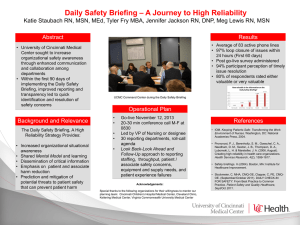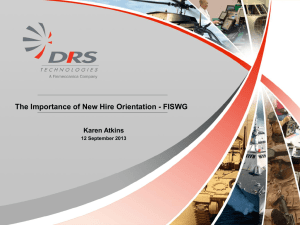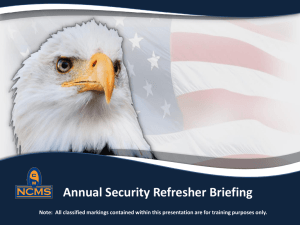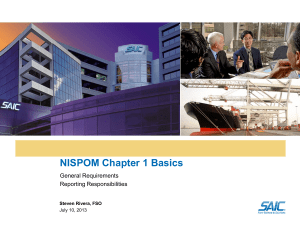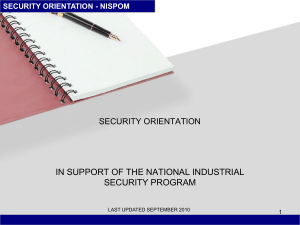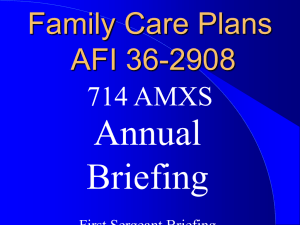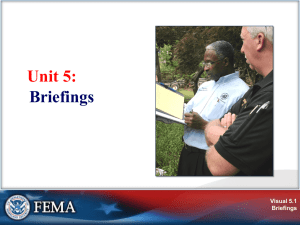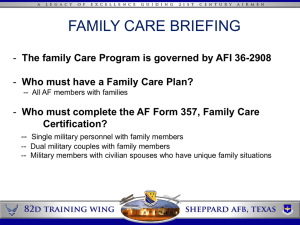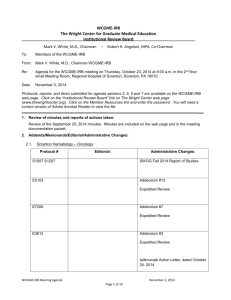Basics-NISPOM Chapter 3 July 2013
advertisement
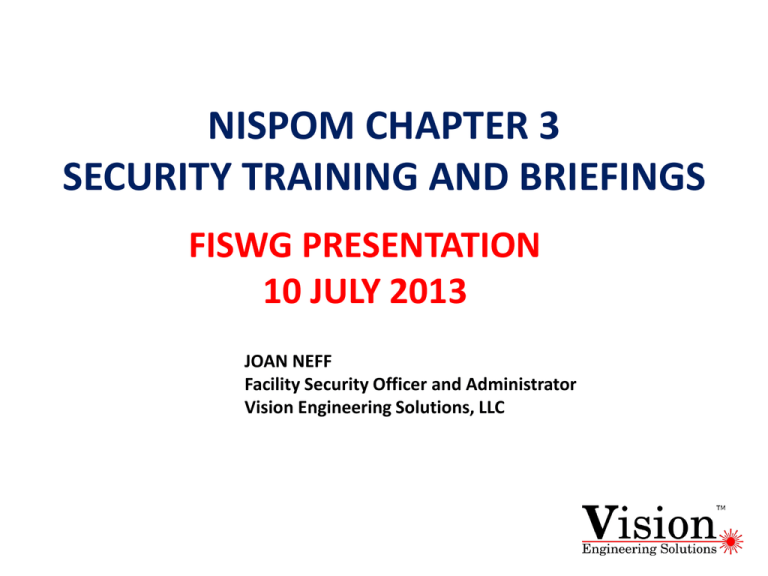
NISPOM CHAPTER 3 SECURITY TRAINING AND BRIEFINGS FISWG PRESENTATION 10 JULY 2013 JOAN NEFF Facility Security Officer and Administrator Vision Engineering Solutions, LLC NISPOM Chapter 3 A tiny chapter with huge responsibilities Security Training and Briefing Requirements • NISPOM 1-205 specifies contractors are responsible for advising all cleared employees of their individual responsibility for safeguarding classified information and for providing security training according to NISPOM Chapter 3 by initial briefings, refresher briefings, and debriefings. • NISPOM 3-100 through 3-108 contains all the information necessary to ensure your training program meets the NISPOM Training requirement Training Goals and Objectives • Awareness of magnitude of foreign and domestic threats • Awareness of security responsibilities and obligations • Awareness of security procedures and practices • Understanding, Motivation and Compliance Security Training and Briefings 3-101 Training Materials To name a few: • DSS offers training information and material on defensive security, threat awareness and other excellent training information • FISWG provides briefing material on its website • Daily newspaper has wealth of articles that can be used for security awareness examples • FBI Newsletters • FSO-generated posters, videos, bulletins Types of Security Training Required by NISPOM Chapter 3 • • • • FSO TRAINING GOVERNMENT-PROVIDED BRIEFINGS TEMPORARY HELP SUPPLIERS EMPLOYEE TRAINING 3-102 FSO Training Effective 14 May 2012, under ISL 20123, the DSS Center for Development of Security Excellence (CDSE) created new curricula to meet the NISPOM 3-102 requirements for FSO Training The curricula takes into account the Facility’s involvement with classified information Note: Successful completion of any of the previous versions of FSO training by CDSE, the DSS Academy, or DoD Security Institute satisfies the current NISPOM FSO training requirement unless advised otherwise by DSS 3-102 FSO Training • Based on a Facility’s involvement with classified information, CDSE has developed these training curricula: – FSO Program Management Curriculum for Possessing Facilities – FSO Orientation Curriculum for Non-Possessing Facilities • Completion within 1 year of appointment FSO Training Curricula http://www.dss.mil/cdse/catalog/curricula/index.html Courses: •FSO Role in the NISP IS021.06 •Introduction to Information Security IF011.06 •ISFD Facility Clearance Verification and Notifications for Industry IS113.06 •DSS e-FCL Submission Site User Guide IS032.16 •Personnel Clearances in the NISP IS142.16 •JPAS/JCAVS Training for Security Professionals PS123.16 •Developing a Security Education & Training Program GS104.06 •Integrating CI and Threat Awareness into your Security Program CI010.16 •Facility Clearances in the NISP IS140.16 •Understanding FOCI IS065.16 •NISP Reporting Requirements IS150.16 •Visits/Meetings in the NISP IS105.16 •NISP Self Inspections IS130.16 •Safeguarding Classified Information in the NISP IS109.16 •Derivative Classification IF103.06 •Marking Classified Information IF105.16 •Transmission and Transportation for Industry IS107.16 FSO Orientation for NonPossessing Facilities FSO Program Management for Possessing Facilities FSO Training Enhancements • Attendance at FISWG Meetings (take advantage of on-line briefings, posters, training material) • Attendance at National Classification Management Society (NCMS) Meetings • DSS On-Line Training https://www.dss.mil Professional Education https://www.dss.mil Professional Education Types of Security Training Required by NISPOM Chapter 3 • • • • FSO TRAINING GOVERNMENT-PROVIDED BRIEFINGS TEMPORARY HELP SUPPLIERS EMPLOYEE TRAINING 3-103 Government-Provided Briefings • CSA provides initial briefings for special categories to the FSO – NATO – COMSEC – CNWDI – Other applicable briefings • Employees briefed by FSO or in group by CSA Types of Security Training Required by NISPOM Chapter 3 • • • • FSO TRAINING GOVERNMENT-PROVIDED BRIEFINGS TEMPORARY HELP SUPPLIERS EMPLOYEE TRAINING 3-104 Temporary Help Suppliers • Requires companies that employ cleared personnel for sole purpose of dispatching them elsewhere (providing a contractual service to another company) to ensure that their cleared personnel receive security briefings and training • Either the Supplier (Temporary Help Employer)or the End User (Using Contractor) may conduct the briefings. Types of Security Training Required by NISPOM Chapter 3 • • • • FSO TRAINING GOVERNMENT-PROVIDED BRIEFINGS TEMPORARY HELP SUPPLIERS EMPLOYEE TRAINING Employee Security Training • Classified Information Nondisclosure Agreement (SF-312) • Initial Security Briefing • Refresher Training • Debriefings 3-105 Classified Information Nondisclosure Agreement The employee’s PSI was to determine his trustworthiness for access to classified information. He was granted a security clearance based on the favorable determination of the investigation results. He must now sign an SF-312 Classified Information Nondisclosure Agreement as a condition of access. You must give the employee an SF-312 briefing and obtain his signature on the Agreement form SF-312 Nondisclosure Agreement • Required upon initial PCL prior to being granted access to classified information • A contractual agreement between the United States and the employee who is cleared for access to classified information • Purpose of the SF-312 Briefing is to inform the employee of: Special trust placed in him by providing access to classified information Obligation to protect that information from unauthorized disclosure, unauthorized retention and/or negligent handling Lifelong commitment and contractual agreement Serious consequences for noncompliance • Briefing Booklet: http://www.archives.gov.isoo/training/standard-form-312.html SF-312 Nondisclosure Agreement FSO must: – annotate JPAS with date SF-312 (NdA) was signed (Select Person>Display Person> Indoctrinate>Date when NdA was signed) – retain a copy of the SF-312 in employee’s security folder and – submit a copy of the form to the Personnel Security Management Office for Industry (PSMO-I) Submitting SF-312 to PSMO-I • Mail: Personnel Security Management Office for Industry 600 10th Street, Suite 160 Fort Meade, MD 20755-5136 • FAX: 301-833-3942 (preferred method) Attn: SF-312 Include FSO’s name, phone, fax number, Email address; and Subject’s name and SSN Employee Security Training • Classified Information Nondisclosure Agreement (SF-312) • Initial Security Briefing • Refresher Training • Debriefings 3-106 Initial Security Briefing • Lecture • Conference Room Setting • One-on-One • Written Briefing (with signed Briefing Acknowledgement ) Initial Security Briefing • • • • Threat Awareness Briefing Defensive Security Briefing Overview of the Security Classification System Employee reporting obligations and requirements • Security procedures and duties applicable to the employee’s job/required by the contract(s) Initial Security Briefing • Threat Awareness Briefing – The threat and the techniques employed by foreign intelligence entities in the attempt to obtain classified information – Seek up-to-date threat information from local authorities concerning foreign intelligence activities and trends • Defensive Security Briefing – Necessity of being security aware, recognizing the warning signals, reporting suspicious activities, and knowing what to watch out for in the office, during foreign travel, attendance at technical conferences, etc. Initial Security Briefing Overview of the Security Classification System • Three levels of classification (TS, S, C) • Accesses (not a level of classification) – COMSEC – CNWDI – NATO – FOUO – Special Access Program (SAP) – Other Initial Security Briefing Employee Reporting Obligations and Requirements Personal Reports: Changes to info reported on SF-86 to include name, marital status, citizenship, dual passport; and involvement with the legal system (arrest/conviction) Foreign Travel and Foreign Contacts: Dates, locations and purpose of travel outside of the United States New/ongoing contacts with foreign nationals and suspicious or threatening contacts/attempts to obtain unauthorized access to classified or proprietary information Adverse Information Factual information that could make an employee vulnerable to exploitative activities, i.e. excessive use of intoxicants, use of illegal/controlled substances, excessive indebtedness or financial difficulties, sudden unexplained displays of affluence, loss or compromise or suspected compromise of classified information, unauthorized attempt by employee to obtain classified or proprietary information Initial Security Briefing Security Procedures and Duties Applicable to the Employee’s Job, such as: • Access briefing(s) (NATO, CNWDI, COMSEC, etc) • Courier • Derivative Classification and Marking • Special Access • IS • Controlled/Closed Area • Gate Closures, Building Access • Escort of Foreign Nationals Employee Security Training • Classified Information Nondisclosure Agreement (SF-312) • Initial Security Briefing • Refresher Training • Debriefings Refresher Training REFRESHER SECURITY TRAINING A chew bar that comes in bite-sized pieces with reinforced flavors A security briefing that gives cleared employees something to chew on that reinforces the initial briefing and provides updates on procedures, regulations and trends 3-107 Refresher Training • NISPOM requirement to provide all cleared employees with some form of security education and training at least annually • Must reinforce information provided during the initial security briefing and keep employees informed of any changes in security regulations • Records must be maintained about the programs offered and employee participation in them Refresher Training • Can be in form of group briefing, interactive videos, dissemination of instructional materials, etc. • Supplement formal training with newsletters, Emails, security posters • Signed/dated affirmation of training (with documentation retained by FSO) • “Vision 2013 Annual Security Awareness Briefing and Refresher Training” will be made available on FISWG website Employee Security Training • Classified Information Nondisclosure Agreement (SF-312) • Initial Security Briefing • Refresher Training • Debriefings Debriefings 3-108 Debriefings • Reminder of lifetime contractual responsibilities Required: • At the time of cleared employee’s termination of employment (administrative separation, resignation or retirement) • When Employee’s PCL is terminated/no longer required (terminated, suspended or revoked) • When the Facility Clearance is terminated Summary of NISPOM Chapter 3 • Contractors must provide cleared employees with security training commensurate with their involvement with classified information • Many tools are available for providing security training • Your goal as an FSO is to ensure employees understand their responsibilities and to motivate their compliance Questions????
